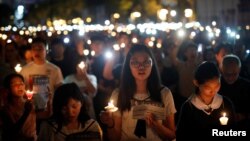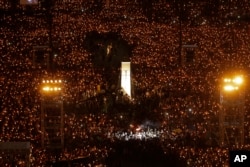As a record 180,000 Hong Kong residents commemorated the 30th anniversary of the 1989 Tiananmen Square democracy protests with a candlelight vigil Tuesday night, attendees and organizers expressed concern about the memorial's future amid political change in Hong Kong.
The autonomous Chinese city and its neighbor, Macau, former British and Portuguese colonies, are the only territories of China that mark the anniversary of Tiananmen Square. Any mention of the 1989 democracy protests in public or the press is heavily censored on the mainland.
Many of those attending Tuesday's vigil said they remembered watching the events of 1989 unfold, which captured the attention of Hong Kong and the world as students occupied Tiananmen Square in the weeks leading up to June 4.
"In 1989, I was a teenager, I remember when I saw the news from the TV and the Beijing students went out to confront the government about their unfair policies," said vigil attendee Jovi Lok. "I am 50, so I remember lots of this. Every year we go here [so we do] not forget the students."
A number of Hong Kong students attended the protests in Beijing while many others organized local events in support during the spring of 1989.
The protest crackdown also showed the former British colony the limits of China's tolerance for dissent, which led many in Hong Kong to work to preserve the protest's memory where they could or become more politically active.
"I think from the start the event is very much linked to the history of Hong Kong, like how Hong Kongers participated and how this event ... [awakened] the identity of Hong Kong people," said vigil attendee Yip Kai-chun.
Hong Kong activists opened a Tiananmen Square museum and organized an annual candlelight vigil after 1989 to commemorate the crackdown, although attendance has waned in recent years outside of major anniversaries or politically turbulent moments.
Many vigil attendees were middle aged or older, showing the democracy protest movement failed to capture the imagination of younger Hong Kongers.
Unlike previous generations, many young people born around or after Hong Kong's handover from Britain to China in 1997 do not feel the same concern for political reform on the mainland, preferring to focus on the fight for democracy closer to home.
"For the local Hong Kong people like me — the younger generation — June 4 is a bit far away from us and it is more for China fighting for democracy," said vigil attendee Crystal Leung, who was born in 1994.
She said local events like 2014's Umbrella Movement held far more significance for young Hong Kong activists, who view the city as distinct from the rest of China.
"I think some Hong Kong people, especially younger ones, want to separate China fighting for democracy from [Hong Kong] fighting for democracy," she said.
Other attendees and vigil organizers, however, thought a more immediate threat to the vigil was under way with the imminent passage of a law permitting extradition of criminal suspects to China.
Attendee Ryan Lee worried that the new extradition agreement would limit Hong Kong's ability to hold "politically sensitive events" such as the Tiananmen Square vigil if the extradition were abused for political reasons. He said he had attended the vigil on Tuesday in part because he worried it might not continue — a sentiment echoed by other attendees.
Albert Ho, who heads the Hong Kong Alliance in Support of Patriotic Democratic Movements of China, which organizes the annual protest, told reporters on Tuesday that he was also concerned the vigil might not continue.
It is often attended by former Tiananmen activists living in exile outside of China, but he said that could change.
"In the past, those dissidents were able to come to Hong Kong and take part in commemorative activities. They were not afraid of being extradited back to China because there is no such arrangement," he said.
"But in due course if for whatever reason they were allowed to come to Hong Kong, they may face the risk of being arrested and subject to extradition."






